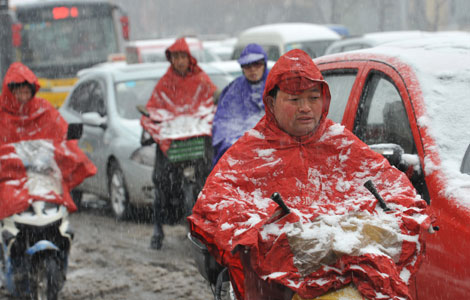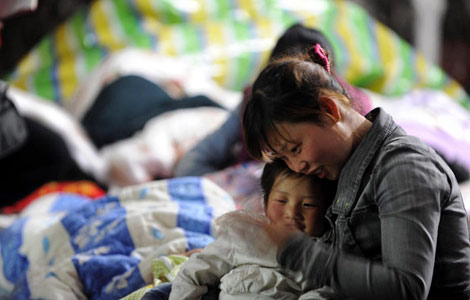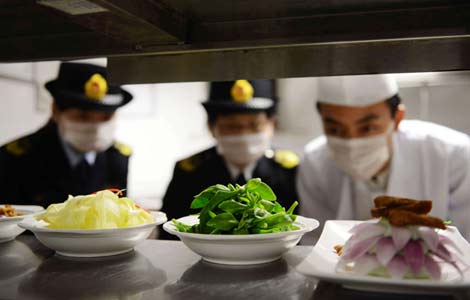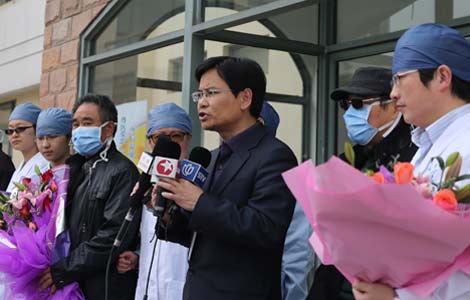S. Korea raises worrying voice over weak yen
Updated: 2013-04-22 17:18
(Xinhua)
|
||||||||
SEOUL - South Korea on Monday raised worrying voice over the weak yen after the Group of 20 countries stopped short of denouncing Japan for devaluing its currency through quantitative easing.
South Korea's Finance Ministry said in an unusual statement that there was an expression of worries at last week's G-20 meeting about the abrupt capital flow into emerging economies stemming from the quantitative easing in advanced economies.
The ministry refuted some media reports that finance ministers and central bankers of G-20 nations gave a full support for "Abenomics", stressing that they shared concerns over the "unintended negative side effects" from Japan's monetary easing.
The Bank of Japan vowed to achieve 2 percent inflation within two years at its first policy meeting presided over by new Governor Haruhiko Kuroda, pledging to purchase 7 trillion yen in government debts every month.
Such monetary easing policies accelerated the devaluation of the Japanese yen further, boosting fears over the worsening of price competitiveness of exporters in neighboring countries.
The South Korean won averaged 1,177.3 won per 100 yen during the first quarter, down from 1,346.6 won in the prior quarter, according to the report released on Monday by the Bank of Korea (BOK). It was the 14.4 percent appreciation of the won versus the yen, the highest since the 14.5 percent gain in the second quarter of 2009.
Earlier this month, a search fellow at Samsung Economic Research Institute (SERI) said in an interview with Xinhua that if the won/yen exchange rate sinks to 1,000 won this year, South Korea's economic growth would fall below 1 percent.
The Finance Ministry slashed its 2013 growth outlook for the country from 3 percent to 2.3 percent, lower than the BOK's forecast of 2.6 percent. The ministry earmarked 17.3 trillion won ($15 billion) in extra budget, the largest since 28.4 trillion won in 2009 when the global financial crisis peaked, to boost the sluggish economy.
The South Korean central bank said in another report submitted to lawmakers that it planned to actively take market-stabilizing measures such as flexible liquidity supply and management of macro- prudential policies, noting that the won/yen exchange rate dropped sharply this year.
The prolonged trend of weak yen would undermine exports, which account for around half of the South Korean economy, through the worsening of price competitiveness. Auto and machinery sectors where South Korean and Japanese exporters are fiercely competing would be hit hard by the weak yen.
The Finance Ministry said earlier in a report that the protracted weak yen along with the delayed global economic recovery would influence negatively the country's exports although the negative impact has yet to be materialized.
On the diplomatic front, the already fragile ties between Seoul and Tokyo worsened further following a series of visits by Japanese cabinet members to the Yasukuni shrine that honors the Japanese war dead of the World War II. Japanese Prime Minister Shinzo Abe was known to have sent the "masakaki" tree to the shrine that is used in rituals.
South Korea's Foreign Ministry Spokesman Cho Tai-young said in a statement that "our government expresses deep concern and regret over the offering (of the tree) by Japanese prime minister and the visit by incumbent cabinet ministers, including deputy prime minister, to the Yaskuni shrine that glorifies its aggressive war, which caused huge losses and pain to the peoples of neighboring countries in the past, and enshrines war criminals".
Cho urged Tokyo to immediately stop the anachronistic act, saying that Japan should restore trust from neighboring countries based on a correct understanding of history.

 Weekly Photos: April 15-21
Weekly Photos: April 15-21
 Residents given shelter in quake-hit region
Residents given shelter in quake-hit region
 US company successfully launches space rocket
US company successfully launches space rocket
 Police: Bombing suspects planned more attacks
Police: Bombing suspects planned more attacks
 Premier: Rescue every person
Premier: Rescue every person
 Chinese soldiers clear mines, win hearts
Chinese soldiers clear mines, win hearts
 Credibility still top concern for Chinese firms
Credibility still top concern for Chinese firms
 More bird flu patients discharged
More bird flu patients discharged
Most Viewed
Editor's Picks

|

|

|

|

|

|
Today's Top News
Rescuers race against time for quake victims
PBOC urges speed in approving changes to IMF
US general visits China for military relations
Millionaire Cartes elected Paraguayan president
DPRK in talks with Iran for oil deals
Investment patterns alter with times
Official promotes Beijing-Washington ties
Baoxing struggles to recover after quake
US Weekly

|

|






